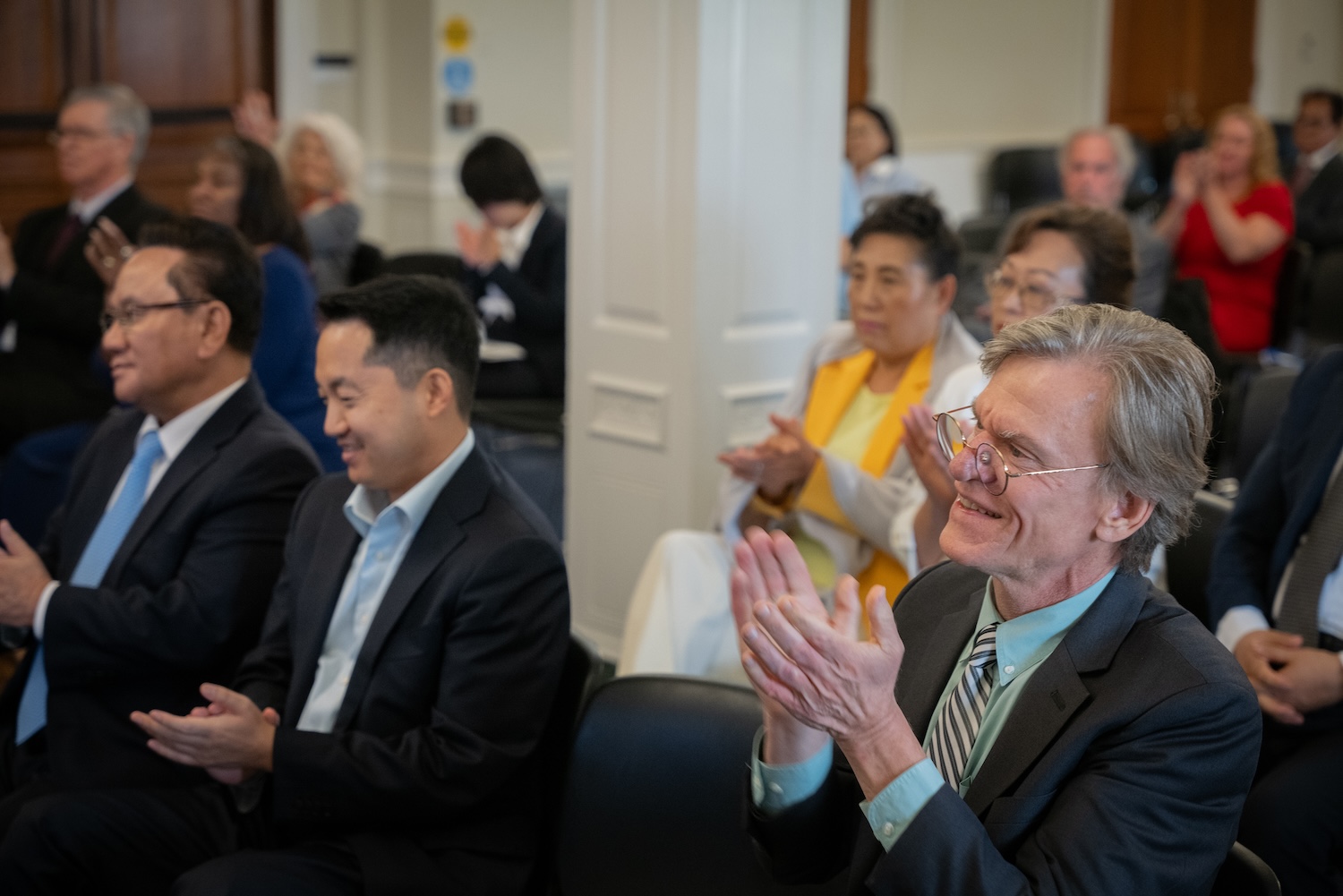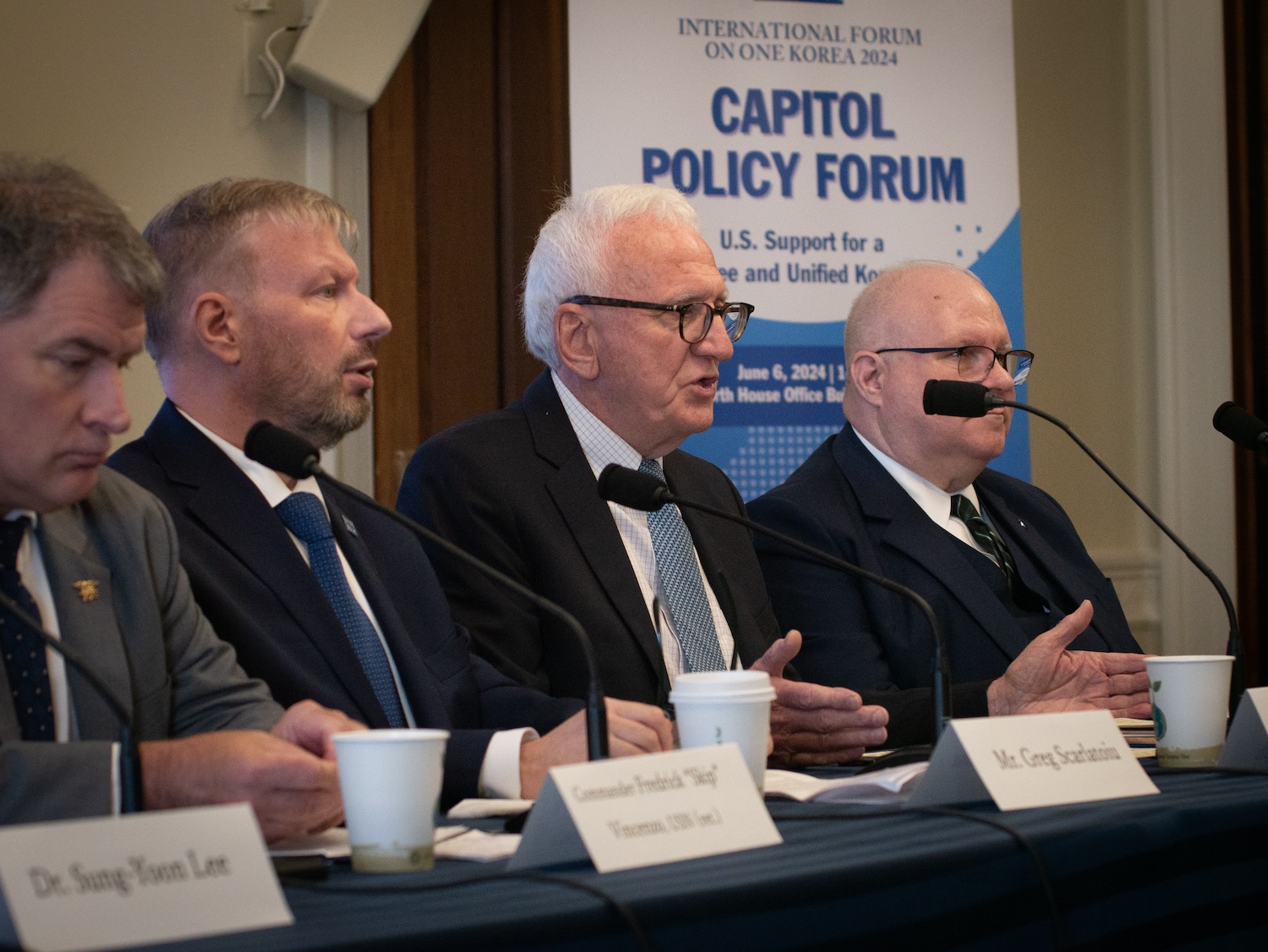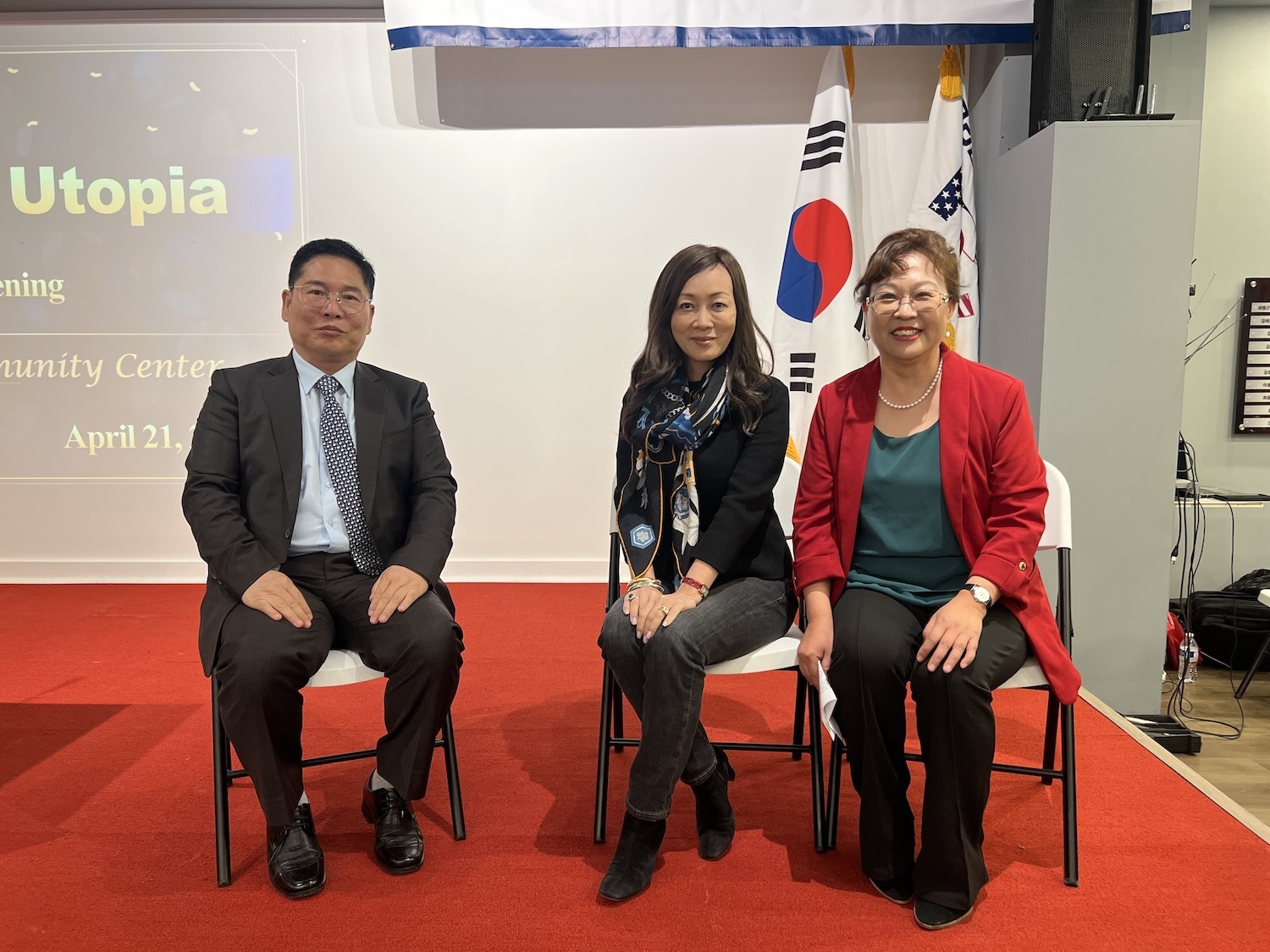South Korean and U.S. lawmakers and policy experts convened in Washington on May 17 in two sessions to urge renewed support for the U.S.-ROK alliance, assess the ongoing security and human rights threat posed by the North Korean regime, and build international consensus toward a free and united Korea.

Iteck Seo, President of Global Peace Foundation-Korea and Co-Chairman of Action for Korea United, addresses the forum.
Meeting just days after a historic summit between South Korean President Yoon Suk Yeol and U.S. President Joseph Biden, panelists from the U.S. and the ROK warmly endorsed the joint statement of the two presidents “to build a better future for all Korean people and support a unified Korean Peninsula that is free and at peace.” The joint statement further said that “the United States and the ROK stand ready to provide humanitarian aid to the most vulnerable North Koreans and will strengthen cooperation to promote human rights in the DPRK.”
Program Emcee Colonel David Maxwell (Ret), a Senior Fellow at the Global Peace Foundation and Vice President of the Center for Asia Pacific Strategy, said the forum would address three principal issues: a “human rights upfront” approach to relations with the DPRK, prioritizing the delivery of information to the Korean people in the North, and the pursuit of a free and unified Korea to advance regional peace and prosperity.
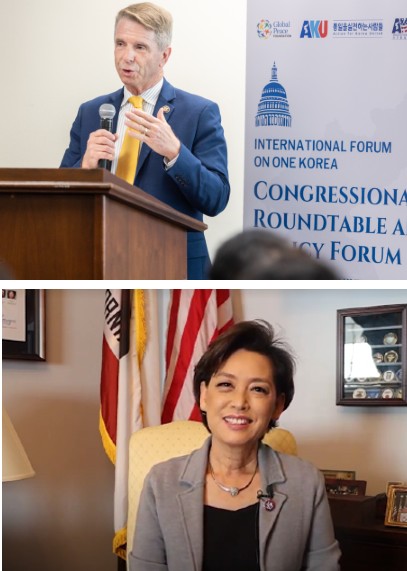
U.S. Reps. Rob Wittman (R-VA), Vice Chair, House Arms Service Committee; and Young Kim (R-CA), Co-Chair of the House Foreign Affairs Committee, affirmed the commitment of the U.S. Congress to the security of South Korea.
In opening remarks, Inteck Seo, President of Global Peace Foundation-Korea and Co-Chairman of Action for Korea United, said a policy framework for the Korean peninsula needs to affirm the long-standing aspiration of the Korean people for a unified homeland that upholds freedom and human rights.
“The regime has failed to provide their people with even the most basic necessities,” Mr. Seo said. “Through gaining access to the information from outside of the regime, North Koreans are being awakened, and they are starting to seek freedom and a better life.”
Recalling the process of German unification, the collapse of the Soviet Union, and the liberation of Eastern Europe, Mr. Seo said unification will not happen through political negotiations. “It should be led by the people, so civil society must create the momentum and generate energy and inspiration for change.”
An alliance of shared values
Bipartisan U.S. congressional leaders and ROK National Assembly members reiterated the importance of the alliance and of a shared commitment to individual rights, democratic governance, a free-market economy, and the rule of law.
U.S. Reps. Rob Wittman (R-VA), Vice Chair, House Arms Service Committee; and Young Kim (R-CA), Indo-Pacific Subcommittee Chair of the House Foreign Affairs Committee and Co-Chair of the Congressional Study Group on Korea, affirmed the commitment of the U.S. Congress to the security of South Korea and of human rights as a “driving force for peaceful Korean unification.”
The U.S.-ROK alliance is “essential to making a free, democratic, and unified Korea a reality,” Rep. Kim said. “As a Korean American who grew up in South Korea after the Korean War, and with relatives who defected North Korea, I too long for one Korea. I also understand what is at stake regarding Kim Jong Un and the North Korean regime.”

ROK National Assembly member Myoung-su Lee (top) and former ROK Deputy Minister of Defense Seung-joo Baek expressed thanks for the support of the U.S. Congress in maintaining a strong alliance between the two nations.
ROK National Assembly representative Myoung-su Lee, a member of the Foreign Affairs and Unification Committee, noted that the joint statement for the first time explicitly affirmed the role of U.S. nuclear deterrence as a measure to confront potential North Korean aggression.
“I commend the Washington Declaration,” he said, “which has elevated the ROK-United States Mutual Defense Treaty to include a mutual dependence concept that encompasses nuclear deterrence, thereby establishing a strong security shield against the nuclear and missile threats posed by North Korea.”
Other distinguished panelists included Seung-joo Baek, President of the War Memorial of Korea; former ROK National Assembly member; and former ROK Deputy Minister of Defense; and Sang-min Lee, a National Assembly representative and member of the Foreign Affairs and Unification Committee.
‘Human rights upfront’
A policy panel of human rights experts, North Korean escapees, scholars, and diplomats decisively concluded that the long-standing policy of separating human rights from denuclearization and other security issues has proven to be a failure.
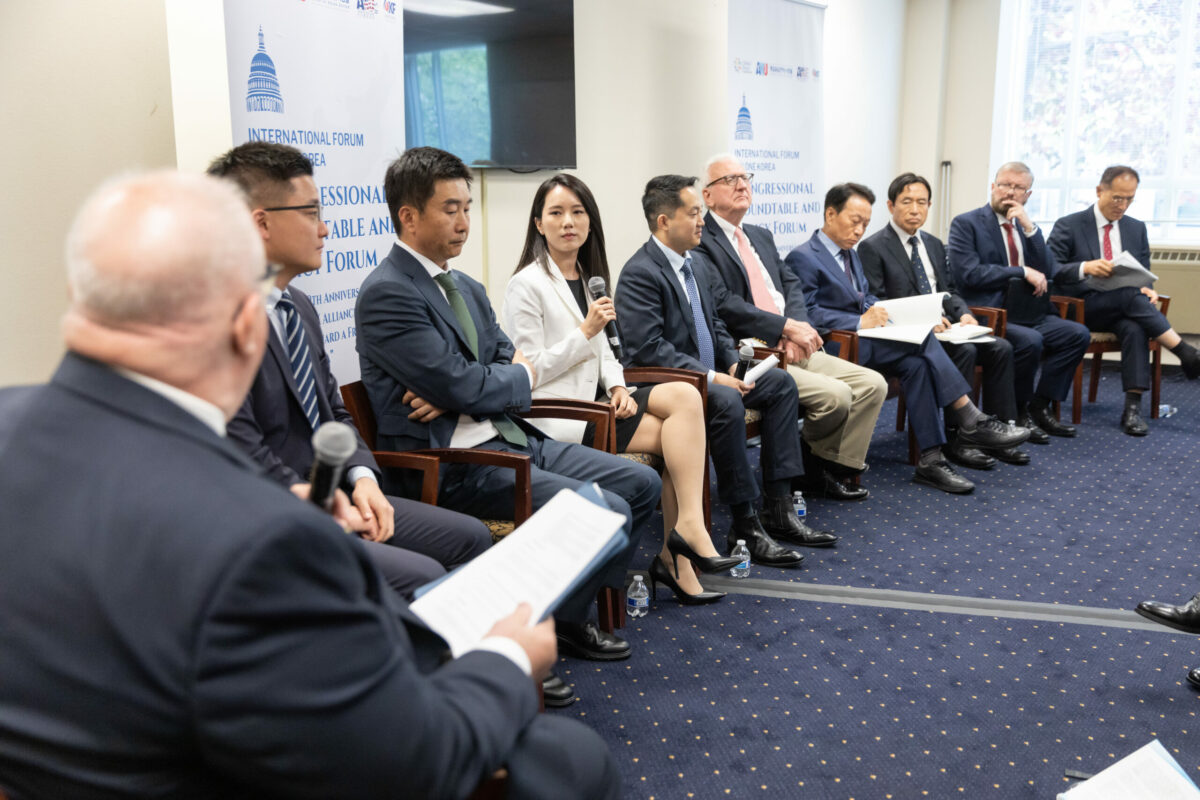
The policy forum of North Korean escapees, human rights advocates, and security experts said human rights was an essential priority in confronting and influencing the North Korean regime.
Ambassador Robert Joseph, Senior Scholar at the National Institute for Public Policy and former Under Secretary of State for Arms Control and International Security, said that in his 26 years in government working in nuclear deterrence, “national security issues were separate from human rights issues. There were two different silos. For 30 years Republican and Democratic administrations alike put nuclear disarmament at the center of our policy. We failed consistently for 30 years, and if you had the perspective that I had, you watched North Korea go from small-scale plutonium reprocessing to full-scale industrial size in uranium enrichment.”

Ambassador Robert Joseph, Senior Scholar at the National Institute for Public Policy and former Under Secretary of State for Arms Control and International Security, said the people living in the North were the greatest threat to the Kim regime.
Arguing for an urgent reassessment of strategy in addressing North Korean security threats, Amb. Joseph concluded that the only solution to the nuclear problem was a regime change from within, driven by the people of North Korea. “A human rights upfront approach does not advocate the use of force to overthrow North Korea,” he said. “This is about regime change from within. Those words need to be said together. Regime change from within.”
“Until now we had to play on North Korea’s strengths,” said Dr. Yong-sup Han, Professor Emeritus and former Vice President of National Defense University of the Republic of Korea and President of the International Security Exchange Association. “Now we have to change our strategy. We have the play on North Korea’s weaknesses, like President Reagan and his strategy to deal with Soviet weakness on technology in the arms race.”
Exposing human rights abuses and, more importantly, strategically prioritizing those criminal acts would exploit the greatest weakness of the Kim regime and bring coercive pressure on issues of denuclearization and economic policy, he said.
‘Tender and tough’ approach
Ambassador Morse Hyung-Myung Tan, Dean of School of Law at Liberty University and the first Asian-American to serve as Ambassador at Large for Global Criminal Justice, further argued for a recalibration of relations with the DPRK.
Advocating a “tender and tough” posture toward the North Korean people and the North Korean regime respectively, he said humanitarian aid, encouragement of emerging market activity, and support for refugees benefit the people living in the north.
“I think the North Korean people are starved for information, and so information that can counter the constant drum beat of propaganda that they are fed would be very important as well,” Amb. Tan said. “This is the worst totalitarian dictatorship on the planet. It is the worst violator of human rights, and committer of mass atrocities and crimes, and it must stop.”
Three escapees from North Korea also spoke to the forum. Hyun-seung Lee, a Fellow on North Korea Studies at the Global Peace Foundation; Cheol-hwan Kang, author of The Aquariums of Pyongyang: Ten Years in the North Korean Gulag and founder and President of the North Korea Strategy Center; and Seo-hyun Lee, a human rights activist and graduate student at Columbia University School of International and Public Affairs, said the people of North Korea want an end of the Kim regime and reunification was the only way to end the human rights abuses and liberate the people in the north.
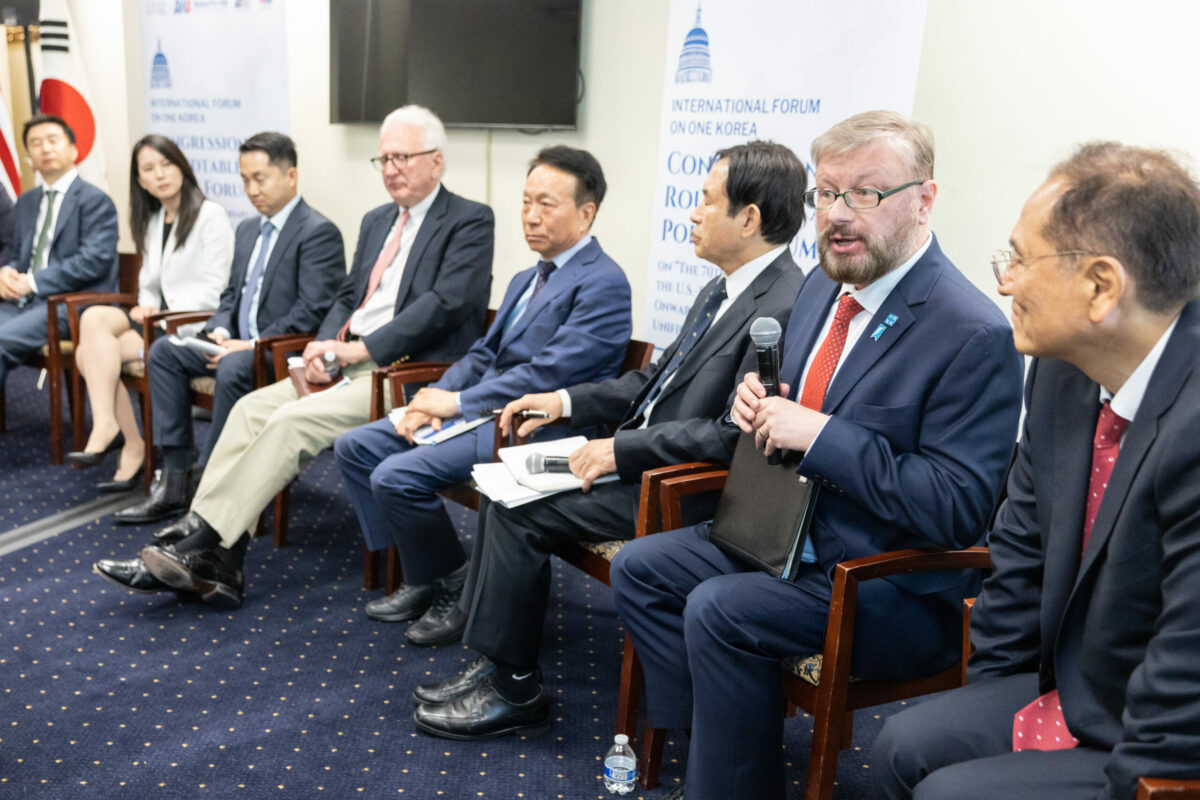
Greg Scarlatiou, Executive Director of Committee for Human Rights in North Korea, discusses North Korea’s human rights abuses during the policy forum.
Other distinguished speakers addressing the forum included Mr. James P. Flynn, International President of the Global Peace Foundation; Mr. Greg Scarlatiou, Executive Director of Committee for Human Rights in North Korea; Dr. Jin Shin, President of the Institute for Peace Affairs and Chairman of the Department of Political Science and Diplomacy and Director of the National Strategy Institute at Chungnam National University; and Dr. Kyung-young Chung, Adjunct Professor at Hanyang University Graduate School of International Studies and former Policy Advisor at the National Security Office at the Blue House.
The International Forum on One Korea Congressional Roundtable and Policy Forum: Onward toward a Unified Korea was co-sponsored by the Global Peace Foundation, Action for Korea United, Alliance for Korea United USA, and the One Korea Foundation. District of Columbia Congresswoman Eleanor Holmes Norton as the congressional host. Since 2009 the Global Peace Foundation has advanced a Korean-led, internationally supported campaign to support a free and unified Korea through international conferences, forums and grassroots campaigns in South Korea and among the Korean diaspora.
For more information visit the One Korea Global Campaign.
Read more:
‘If left divided, Korean Peninsula will never be at peace’
US expert calls for radical shift in strategy to rid Pyongyang of nuclear arms

